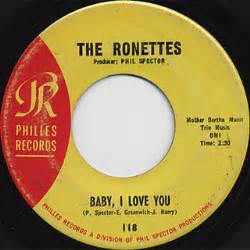| "Is This What I Get For Loving You?" | ||||
|---|---|---|---|---|
| Single by The Ronettes | ||||
| B-side | "Oh, I Love You." | |||
| Released | June 1965 | |||
| Format | 7" single | |||
| Genre | Pop | |||
| Length | 2:40 | |||
| Label | Philles Records | |||
| Songwriter(s) | Phil Spector Gerry Goffin Carole King | |||
| Producer(s) | Phil Spector | |||
| The Ronettes singles chronology | ||||
| ||||
"Is This What I Get For Loving You?" is a pop song written by Phil Spector, Carole King and Gerry Goffin [1] and recorded by 1960s girl group The Ronettes. The song featured Ronettes lead singer Ronnie Spector on lead vocals (credited as Veronica), and Ronettes Nedra Talley and Estelle Bennett on backing vocals. Released on Philles Records, reaching No. 75 on the Billboard Hot 100 in 1965.

Phillip Harvey Spector is an American record producer, musician, and songwriter who developed the Wall of Sound, a music production formula he described as a Wagnerian approach to rock and roll. Spector was dubbed the "First Tycoon of Teen" by writer Tom Wolfe and is acknowledged as one of the most influential figures in pop music history. After the 1970s, Spector mostly retired from public life. In 2009, he was convicted of second-degree murder and has remained incarcerated since.

Carole King is an American singer-songwriter who has been active since 1958, initially as one of the staff songwriters at the Brill Building and later as a solo artist. She is the most successful female songwriter of the latter half of the 20th century in the US, having written or co-written 118 pop hits on the Billboard Hot 100 between 1955 and 1999. King also wrote 61 hits that charted in the UK, making her the most successful female songwriter on the UK singles charts between 1952 and 2005.
Gerald Goffin was an American lyricist. Writing initially with his wife Carole King, he co-wrote many international pop hits of the early and mid-1960s, including the US No.1 hits "Will You Love Me Tomorrow", "Take Good Care of My Baby", "The Loco-Motion", and "Go Away Little Girl". It was later said of Goffin that his gift was "to find words that expressed what many young people were feeling but were unable to articulate."





